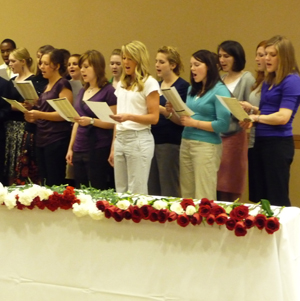 |
First year students from the College of Medicine and the School of Allied Health Professions sing during the recent Anatomical Gift Program Memorial Services in the Sorrell Center’s Truhlsen Campus Events Center. The ceremony allowed the students to honor those who donated their bodies to be used for sciences. (Photo by Liz Kumru, UNMC public relations) |
That’s the way Robert Binhammer, Ph.D., sees it. And considering he’s taught anatomy for more than 50 years — including 30 years at UNMC — you could say he knows a thing or two about the subject.
“Books can teach you a whole lot but they’re inadequate,” the professor of genetics, cell biology and anatomy said. “No textbook or simulator can account for the variety these students will encounter in reality. And it’s vital that the students understand that.”
Earlier this month, first-year students from the UNMC College of Medicine and the School of Allied Health Professionals hosted a ceremony to honor those who have donated their bodies as anatomical gifts to be used for scientific research and training.
More than 100 people who donated their bodies and their families were honored during the annual Anatomical Gift Program Memorial Service, which was held in the Truhlsen Campus Events Center on April 17.
Each year, nearly 200 people donate their bodies to the Nebraska Anatomical Board — about half of those bodies go to UNMC to be used in the medical center’s Gross Anatomy Lab or the Advanced Anatomy Laboratory for Research, Education and Clinical Skills.
For first year medical and physical therapy students — those who donate their bodies have become some of the best instructors they will meet during their time at UNMC.
|
|
And aside from showing the incredible variety in each individual’s anatomy, working with the bodies helps students become comfortable working with real bodies, said Carol Lomneth, Ph.D., a professor of genetics, cell biology and anatomy.
“It’s essential for health professional students to acquire a comfortable objectivity with their patients and working with real cadavers helps develop this quality,” Dr. Lomneth said.
Such lessons are vital to the students’ success and the recent ceremony was a chance for the students to honor the donors and thank their families for carrying out the donors wishes, Dr. Lomneth said.
“This is an opportunity for the students to give back and thank those who have given their bodies to advance their education,” she said. “It is impossible to put a value on the lessons these people have taught our students by their choices to donate their bodies.”